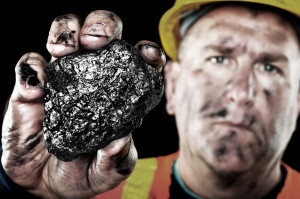Coal may not be king in Nebraska, but it fuels much of electricity

By Deena Winter | Nebraska Watchdog
LINCOLN, Neb. — Nebraska may not have any coal mines, but coal fuels about two-thirds of the electricity produced in Nebraska, enabling the state’s utilities to charge some of the lowest rates in the nation.
New EPA rules could change that, opponents say.
COAL SHOULDER: coal fuels about two-thirds of the electricity produced in Nebraska, enabling the state’s utilities to charge some of the lowest rates in the nation. Opponents of the new EPA rules say they could threaten that.
President Obama’s plan to reduce carbon emissions on power plants — released by the EPA on Monday — will impact Nebraska because so much of its energy comes from coal-fired power stations, and trainloads of coal rumble from Wyoming through Nebraska every day.
A study on the impact of coal on Nebraska by the University of Nebraska-Lincoln Bureau of Business Research estimated the state’s seven coal-fired electric generation plants and coal-related rail activity generate almost $4.9 billion in economic output, more than $1.4 billion in labor income, more than 22,800 jobs and $142 million in income, sales and property taxes.
Nebraska’s congressional delegation denounced the EPA’s rule mandating that power plants reduce carbon emissions 30 percent by the year 2030. U.S. Sen. Deb Fischer, a Republican, said the new regulations could increase annual electric bills by $200 per family and cause the loss of nearly a quarter-million jobs by 2030, according to a study by the U.S. Chamber of Commerce.
Fischer was one of 47 senators who asked the EPA to extend the comment period for the proposed regulations.
Because Nebraska is a public power state, Fischer said Nebraska taxpayers could be on the hook twice — first to pay for the cost of retrofitting power plants and again to pay for the increased cost to power homes and businesses.
The Nebraska chapter of Americans for Prosperity called on Congress to block the EPA rules.
“Nebraskans shouldn’t have to worry about whether they can afford to power their homes in the summer,” said AFP-Nebraska State Director Matt Litt. “With continued delays on building the Keystone XL pipeline and now Draconian EPA regulations on power plants, the Obama administration clearly has no concern for Nebraska’s energy sector. Empowering bureaucrats in Washington to hike energy costs is the wrong way forward for Nebraska.”
But Bold Nebraska applauded the president’s “strong action against the threat of climate change to our health, air and water.” The group advocates against the use of Canada’s tar sands oil and supports using less coal and more renewable energy.
“We stand with President Obama as he does his part to protect the Heartland’s water and the health of our families,” the progressive group said in a statement Monday.
If less coal is transported by rail through Nebraska, it would impact the state because the headquarters of Union Pacific railroad is in Omaha, and the state is home to three large switching yards for UP and BNSF Railway. According to the American Railroad Association, coal hauling accounted for nearly 22 percent of all U.S. rail revenue in 2012. The UNL study estimated coal-related rail activity generates $2.9 billion in annual output and creates 6,750 jobs in Nebraska.
“Nebraska rail crews are busy operating coal trains and maintaining tracks, thereby supporting Nebraska employment,” the study said.
But the Democrat running for the U.S. Senate in Nebraska, Dave Domina, applauded the EPA rules, saying they’re flexible and the facts make it clear there’s a need to reduce carbon particles from coal-powered plants.
“That needs to be done,” Domina said during a Monday debate. “Science is real, and the impact that fossil fuels are having on our environment are real.”
The Republican Senate nominee, Ben Sasse, disagreed, saying America needs an “all of the above” energy strategy rather than making war on industries like coal. The EPA proposal will be “very destabilizing on Nebraska,” he said.
This planet was blessed with a variety of energy sources, and Nebraska families are some of the most “environmentally serious” people in the nation, Sasse said, because they live off the land. He said he supports the proposed Keystone XL oil pipeline and the extraction of more North American oil and natural gas.
“The Obama administration doesn’t have an all of the above strategy — they have a Solyndra Strategy,” Sasse said, referring to a California solar company that went bankrupt despite $529 million in government subsidies.
Contact Deena Winter at deena@nebraskawatchdog.org. Follow Deena on Twitter at @DeenaNEWatchdog
Editor’s note: to subscribe to News Updates from Nebraska Watchdog at no cost, click here.







